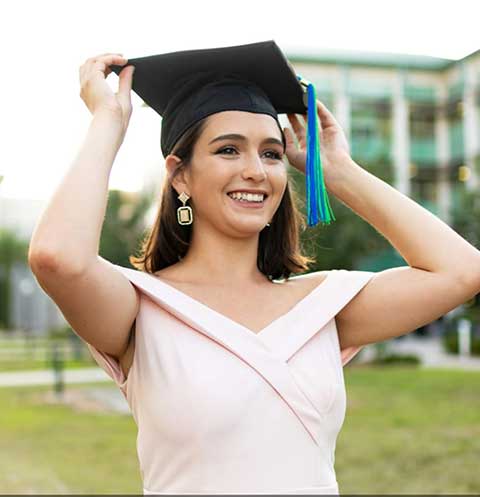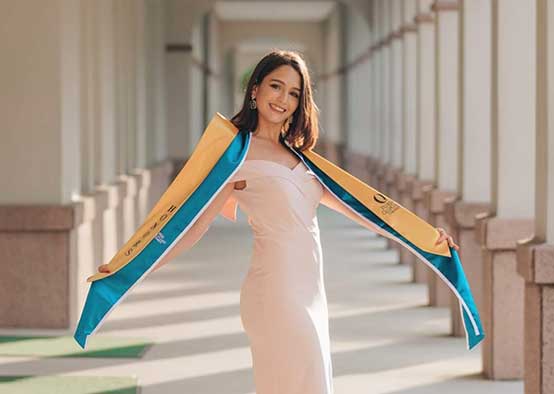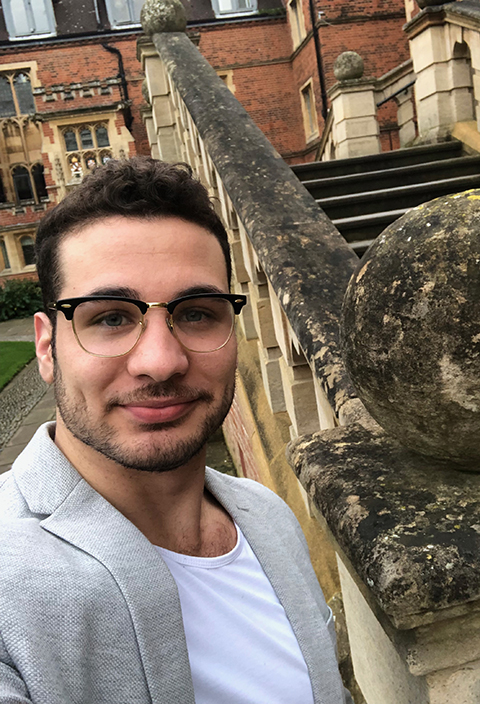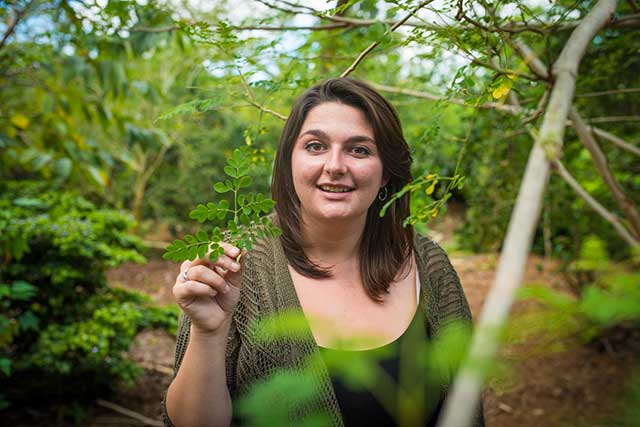
When FGCU alumna Carolyne Mesa was growing up in Lake Worth, she became adept at bridging divergent worlds.
At home, her family spoke mostly Spanish. Her grandparents came to the United States from Cuba not being able to read or write; her parents worked blue-collar jobs to support the family and Mesa’s education. At school in affluent Palm Beach County, many of her peers didn’t understand Cuban culture, didn’t have to work to help their families and took educational opportunities for granted.
“The street I lived on was the border between two school districts that varied very much from each other, so I grew up navigating two different worlds,” the 2019 graduate explains. “I feel like I’ve been an ambassador my whole life. I’ve always felt very encouraged to bring the mix together and show people where I come from.”
Mesa will have the opportunity to expand her calling as a cultural ambassador on an international level come January when she leaves for Uzbekistan on a Fulbright grant. She’s Florida Gulf Coast University’s first Fulbright recipient since 2016.
Her placement through Fulbright’s English Teaching Assistant Program originally was set for this September through June 2021. The COVID-19 pandemic has delayed her start, but she has been told she could have an opportunity to extend her stay if circumstances allow.
The first in her family to attend college, Mesa graduated magna cum laude with majors in communications and philosophy as well as international experience under her golden Honors College sash. She spent a semester abroad in Italy, where she studied the language and traveled throughout Europe.
After graduation, she added another language to her repertoire, completing an intensive seven-week Uzbek course at Arizona State University’s Critical Language Program. She first became interested in the former Soviet republic in high school while studying the Silk Road, the ancient trade route linking central China with the western world. The transcontinental track threaded through parts of what is now Uzbekistan, including the gateway cities of Samarkand and Tashkent.
“I am very excited to travel and live in Uzbekistan,” she says. “I am sure it will be an adjustment, but I like challenges and am very good at adapting to my environment.”
Since completing her Uzbek course, Mesa has been working as a research specialist for a global information technology consulting company in Fort Myers, which ties together several of her interests and goals.
“I love learning about all the latest technology and trends in business,” she says. “Ultimately, I want to understand the relationship between computer science and philosophy, psychology, linguistics. Then help people prepare for the ‘new digital age.’”
Family’s tears of joy
Mesa credits Terumi Rafferty-Osaki, director of FGCU’s Office of Competitive Fellowships, with helping her navigate the complicated Fulbright application process to a successful conclusion on her second try.
“He was consistent from the very beginning and believes in me in a way no one ever has,” she says. “Through the application process, I learned so much about myself, my community and the difference I want to make. In addition to the office, the faculty within the department of philosophy has widely contributed to my academic success.”
Rafferty-Osaki recognized her potential the first time Mesa visited to the Office of Competitive Fellowships.

“I felt she had that special combination of being an explorer, a dreamer, having resilience, and a great work ethic,” he recalls. “Even with all of her accolades, it was clear Carolyne was down to earth and truly wants to help people. It was a joy working with her on the Fulbright.”
The Fulbright U.S. Student Program is the largest American exchange program offering opportunities for students and young professionals to undertake international graduate study, advanced research and teaching. The program awards about 2,000 grants annually in all fields of study and operates in more than 140 countries.
Mesa becomes the third FGCU student or alum to earn a Fulbright, after Emilio Feijoo (’15, Philosophy and English) and Lori Boegershausen (’16, History), who were awarded grants in 2016 (see sidebar below). When she received a notification email from the organization on her phone in March, Mesa was in the middle of cooking dinner at her parents’ home. The night before, she had prepared herself for receiving the expected news. She bookmarked the Fulbright portal. Saved her log-in info. Two clicks and she would be online to get the news.
“When I received the email I immediately turned off the stove, ran upstairs, and the whole time repeated to myself ‘no matter what happens, you will be OK,’ “ she says. “I read the third sentence, unplugged my laptop and ran downstairs. I was in tears and speechless, so all I could do was give my mom and dad the laptop and tell them to read. My mom cried and my dad was smiling. We hugged each other, and it was a moment that I will remember forever.”
Just becoming the first in her family to attend college was a major achievement, long before she dreamed about studying or working abroad. Through dual enrollment, Mesa was able to able to complete two years of courses at Palm Beach State College while still attending high school and working part time at a restaurant.
“Education was always something my parents stressed for me. In high school if I was not doing well in math they would spend hours finding someone who could help me. They did everything they could to help make sure I had a good SAT score and the resources I needed. I definitely wouldn’t have been able to do it without their support.”
Getting involved at FGCU
Although she originally wanted to finish college closer to home, Mesa says she liked attending a university where professors have time to give students more individual attention and where students are encouraged to engage with the community off campus.
“I couldn’t have made a better decision,” she says.
After she transferred to FGCU, Mesa took advantage of every opportunity she could while continuing to work as a server and bartender. She shared her experiences with peers as a mentor in the Honors College, practiced leadership skills in a professional development club and completed more than 800 hours of service-learning.
“I always felt a bit different from some of my peers who didn’t need to work or for whom education was a given,” she says. “I knew early on I had a lot of catching up to do to be competitive in this environment. I saw opportunities and I had the bandwidth and energy to take advantage of them. College is really what you as an individual make of it.”
One of those opportunities that has been the most meaningful for Mesa is working with the Lee County Guardian Ad Litem program. In family law cases, volunteers like her evaluate family situations and make recommendations to the court that are in the best interest of the children.
“To help the trajectory of children I advocate for, to know that child is in a safe spot, is a huge reward,” Mesa says.
Representing others, as well as her culture, seems to come naturally. With her Fulbright experience and other travels, Mesa also hopes to represent the diversity of the United States abroad while she explores other cultures. Dancing is another one of her passions, so she hopes to learn some traditional Uzbek steps while sharing her salsa and cha-cha moves.
“I’m very curious about how other people live,” she says. “I’m interested in immersing myself in another culture and country and showing people in another country how diverse Americans are — we don’t all have blond hair and blue eyes. I really want to highlight that and be an ambassador for United States.”
Catching up with FGCU’s first Fulbrighters
In spring 2016, two FGCU students became the first in the school’s history to be chosen for prestigious Fulbright grants to study or teach abroad.
Emilio Feijoo graduated in 2015 with bachelor’s degrees in philosophy and English. On his Fulbright grant, he completed research for his first master’s in the Ideology and Discourse Analysis Program at the University of Essex in Colchester, England. He returned to England in 2018 for a master’s in sociology at the University of Cambridge’s Selwyn College; he was awarded the 2019 Polity Prize for earning the highest marks in the program.
Lori Boegershausen graduated in May 2016 with a bachelor’s degree in history and was offered a Fulbright English Teaching Assistant Grant to teach in Germany for a year.
Both were the first in their families to earn college degrees with the help of FGCU Foundation scholarships. On the occasion of FGCU’s first student Fulbright grant since their awards, FGCU360.com asked the duo about their experiences abroad and where they are now. Here’s what they wrote back:

Emilio Feijoo
I returned from Cambridge and eventually found employment at a law firm in Naples. About one year later, I am now the chief operating officer and director of marketing for The Law Offices of Marc L. Shapiro, P.A.
The Fulbright experience taught me the importance of international discourse and diplomacy. The research methods I learned in Essex and Cambridge prepared me, in an uncanny way, with skills that flourish at a law firm. I love that I can use my software and technological knowledge to improve systems at the law firm as well as my colleagues’ well-being as they labor.
The quantitative and qualitative aspects of my research prepared me to handle and deconstruct complex structures, logical processes, and digital workflows required to run a law firm’s daily operations.
When time permits, I read and discuss (German philosopher Georg) Hegel, dialectics, punctuation and intellectual history with some of my colleagues. We also have down-to-earth reflections on improving our local community through changes in political economy, discourse and rhetoric.
While the law firm has been a great opportunity and experience, my goals are to return to academia to complete a Ph.D. in philosophy, literature or sociology. To keep me focused on my goals I am working on turning my dissertation into an academic monograph.

Lori Boegershausen
In 2016, I was a Fulbright English Teaching Assistant for Artland Gymnasium in Quakenbrück, Germany. While there, I taught cultural lessons on racism in the United States, dialect differences, the Rust Belt and sustainability.
My initial grant proposal was to engage the community in conversations around sustainability and agriculture. I did manage to volunteer on a replica of Charlemagne’s garden and work with fifth-grade students on the school garden, however, my time in Germany was during the height of refugee immigration from the East. On the way to the city from my small idyllic town, I would pass tent camps of refugees. This reality pushed my community engagement to focus on immigration and integration. I volunteered heavily with the FIZ Intergrationszentrum (Youth Integration Center). The center welcomed refugees and immigrants from all over to come together and have a place to not only learn German and English, but also celebrate their cultures.
My time as a Fulbright ETA was transformative. I was able to immerse myself in a culture and language for an entire year. They say that when you start to learn another language you learn another version of yourself. You are forced to learn how to express yourself in new ways. First, you are frustrated by your inability. Then you realize that your first language can no longer capture your feelings or thoughts. During my year, I began to appreciate the beauty of language and culture. How there can be differences, yet overarching similarities.
Upon return to the U.S, I wanted to continue to understand how development practitioners can aid countries in improving their economic performance, living standards, sustainability, etc. I began a master’s in international development at Ohio University. The majority of my cohort were Fulbright researchers from various countries, such as Palestine, Afghanistan and Ecuador. It was as if I was able to have a second year again.
My master’s thesis project was a U.S.–Ecuadorian Embassy grant focused on a women’s empowerment initiative for Hearts of Gold, a nonprofit in Ecuador, where I was able to work for a summer semester. My time abroad in Germany provided me the comfortability to navigated living in Ecuador during graduate school.
Shortly after graduation, I accepted a job at the Foundation for Appalachian Ohio in Nelsonville, Ohio. The regional community foundation serves Appalachian Ohio’s 32 counties with the mission to create opportunities for citizens and communities by inspiring and supporting philanthropy. In particular, I have been working with the foundation’s college scholarship program and community development work.
My love for community engagement began at Florida Gulf Coast University. I am honored to be an alumnus of a university that ignited my passion for helping others.